-
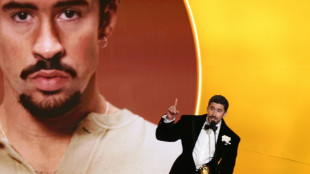 Bad Bunny makes Grammys history with Album of the Year win
Bad Bunny makes Grammys history with Album of the Year win
-
Steven Spielberg earns coveted EGOT status with Grammy win
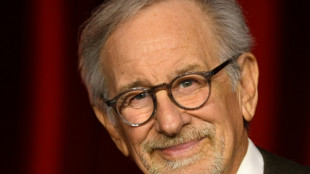
-
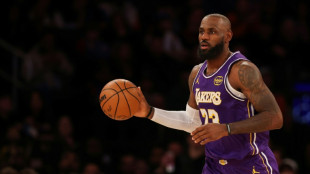 Knicks boost win streak to six by beating LeBron's Lakers
Knicks boost win streak to six by beating LeBron's Lakers
-
Kendrick Lamar, Bad Bunny, Lady Gaga triumph at Grammys
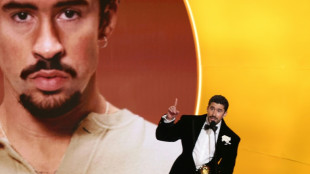
-
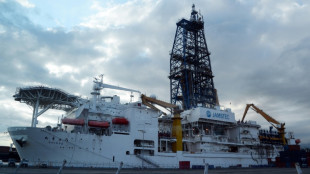 Japan says rare earth found in sediment retrieved on deep-sea mission
Japan says rare earth found in sediment retrieved on deep-sea mission
-
San Siro prepares for last dance with Winter Olympics' opening ceremony
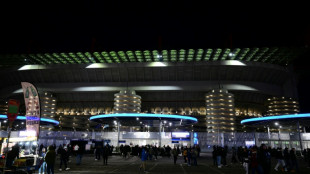
-
 France great Benazzi relishing 'genius' Dupont's Six Nations return
France great Benazzi relishing 'genius' Dupont's Six Nations return
-
Grammy red carpet: black and white, barely there and no ICE
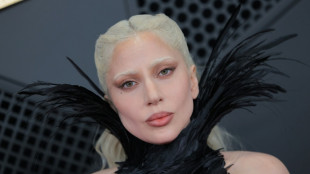
-
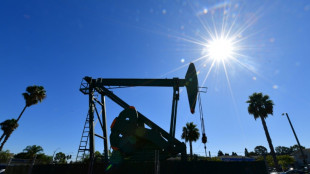 Oil tumbles on Iran hopes, precious metals hit by stronger dollar
Oil tumbles on Iran hopes, precious metals hit by stronger dollar
-
South Korea football bosses in talks to avert Women's Asian Cup boycott
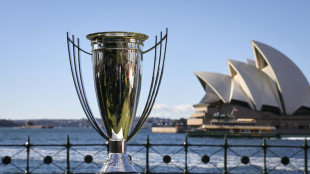
-
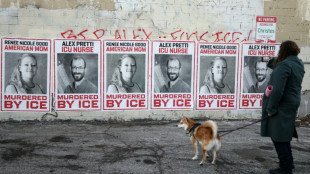 Level playing field? Tech at forefront of US immigration fight
Level playing field? Tech at forefront of US immigration fight
-
British singer Olivia Dean wins Best New Artist Grammy
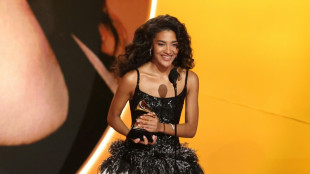
-
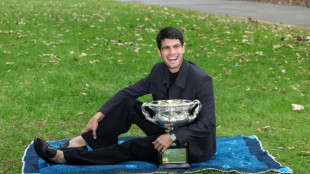 Hatred of losing drives relentless Alcaraz to tennis history
Hatred of losing drives relentless Alcaraz to tennis history
-
Kendrick Lamar, Bad Bunny, Lady Gaga win early at Grammys
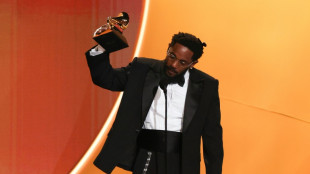
-
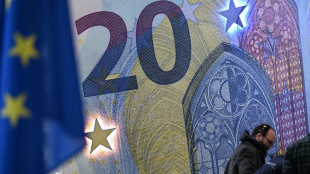 Surging euro presents new headache for ECB
Surging euro presents new headache for ECB
-
Djokovic hints at retirement as time seeps away on history bid
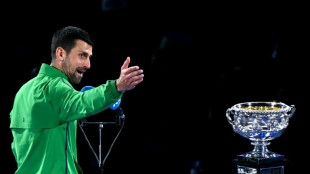
-
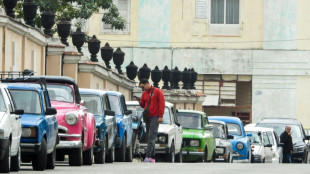 US talking deal with 'highest people' in Cuba: Trump
US talking deal with 'highest people' in Cuba: Trump
-
UK ex-ambassador quits Labour over new reports of Epstein links
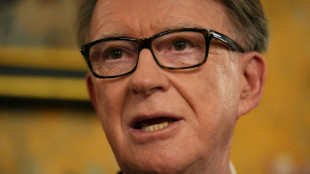
-
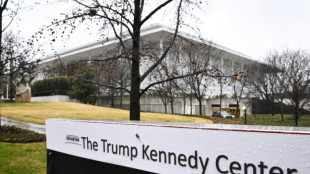 Trump says closing Kennedy Center arts complex for two years
Trump says closing Kennedy Center arts complex for two years
-
Reigning world champs Tinch, Hocker among Millrose winners

-
 Venezuelan activist ends '1,675 days' of suffering in prison
Venezuelan activist ends '1,675 days' of suffering in prison
-
Real Madrid scrape win over Rayo, Athletic claim derby draw
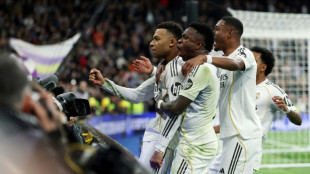
-
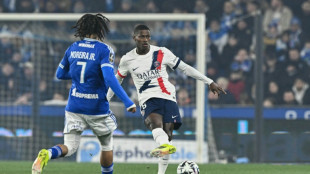 PSG beat Strasbourg after Hakimi red to retake top spot in Ligue 1
PSG beat Strasbourg after Hakimi red to retake top spot in Ligue 1
-
NFL Cardinals hire Rams' assistant LaFleur as head coach

-
 Arsenal scoop $2m prize for winning FIFA Women's Champions Cup
Arsenal scoop $2m prize for winning FIFA Women's Champions Cup
-
Atletico agree deal to sign Lookman from Atalanta

-
 Real Madrid's Bellingham set for month out with hamstring injury
Real Madrid's Bellingham set for month out with hamstring injury
-
Man City won't surrender in title race: Guardiola

-
 Korda captures weather-shortened LPGA season opener
Korda captures weather-shortened LPGA season opener
-
Czechs rally to back president locking horns with government

-
 Prominent Venezuelan activist released after over four years in jail
Prominent Venezuelan activist released after over four years in jail
-
Emery riled by 'unfair' VAR call as Villa's title hopes fade

-
 Guirassy double helps Dortmund move six points behind Bayern
Guirassy double helps Dortmund move six points behind Bayern
-
Nigeria's president pays tribute to Fela Kuti after Grammys Award

-
 Inter eight clear after win at Cremonese marred by fans' flare flinging
Inter eight clear after win at Cremonese marred by fans' flare flinging
-
England underline World Cup
credentials with series win over Sri Lanka

-
 Guirassy brace helps Dortmund move six behind Bayern
Guirassy brace helps Dortmund move six behind Bayern
-
Man City held by Solanke stunner, Sesko delivers 'best feeling' for Man Utd

-
 'Send Help' debuts atop N.America box office
'Send Help' debuts atop N.America box office
-
Ukraine war talks delayed to Wednesday, says Zelensky

-
 Iguanas fall from trees in Florida as icy weather bites southern US
Iguanas fall from trees in Florida as icy weather bites southern US
-
Carrick revels in 'best feeling' after Man Utd leave it late

-
 Olympic chiefs admit 'still work to do' on main ice hockey venue
Olympic chiefs admit 'still work to do' on main ice hockey venue
-
Pope says Winter Olympics 'rekindle hope' for world peace

-
 Last-gasp Demirovic strike sends Stuttgart fourth
Last-gasp Demirovic strike sends Stuttgart fourth
-
Sesko strikes to rescue Man Utd, Villa beaten by Brentford

-
 'At least 200' feared dead in DR Congo landslide: government
'At least 200' feared dead in DR Congo landslide: government
-
Coventry says 'sad' about ICE, Wasserman 'distractions' before Olympics

-
 In-form Lyon make it 10 wins in a row
In-form Lyon make it 10 wins in a row
-
Man Utd strike late as Carrick extends perfect start in Fulham thriller

China vs. Putin and Kim?
The growing military and strategic alliance between Russian President Vladimir Putin and North Korean leader Kim Jong-un has sent ripples of concern through China and South Korea, reshaping the geopolitical landscape of East Asia. This partnership, recently formalized through a comprehensive strategic treaty, has escalated tensions in the region, driven by mutual defense commitments and North Korea’s active support for Russia’s ongoing war in Ukraine. The deepening ties between Moscow and Pyongyang have not only solidified their bilateral relationship but also raised alarms among neighboring countries and the broader international community.
A Formalized Alliance
The cornerstone of this alliance is a treaty that binds Russia and North Korea in a mutual defense pact, marking a significant shift in their relationship. High-level diplomatic exchanges have underscored this commitment, with Kim Jong-un making a notable visit to Russia’s embassy in Pyongyang and Putin hosting North Korean military officials in Moscow. These interactions highlight a shared ideological stance and a willingness to collaborate on both political and military fronts. Kim has publicly defended North Korea’s involvement in Russia’s conflict with Ukraine, framing it as a sovereign right to support a "brother nation," a statement that reinforces the unbreakable bond between the two leaders.
Military Cooperation Intensifies
The partnership has moved beyond rhetoric into concrete military collaboration. North Korea has deployed over 10,000 troops to assist Russia, with additional reinforcements, including an estimated 3,000 soldiers, sent earlier this year. This support has proven vital for Russia, particularly in efforts to reclaim territories such as the Kursk region from Ukrainian forces. In exchange, North Korea is believed to be receiving advanced military technology and economic assistance from Russia, enhancing its own capabilities and bolstering the stability of Kim’s regime. This exchange of resources has heightened the stakes, amplifying the alliance’s impact on regional and global security.
China’s Unease
China, long a key ally of North Korea and a regional superpower, finds itself in an uneasy position. Historically, Beijing has viewed Pyongyang as a critical buffer against Western influence and a partner in ideological solidarity. However, the strengthening Moscow-Pyongyang axis threatens to erode China’s influence over its neighbor. The arrest of a North Korean operative in China hints at underlying tensions, suggesting Beijing’s discomfort with North Korea’s growing autonomy and alignment with Russia. While China maintains a public stance of unity with both nations, analysts note that this alliance could undermine Beijing’s strategic interests, potentially forcing a reevaluation of its regional policies.
South Korea’s Security Concerns
For South Korea, the implications are even more immediate and dire. The enhanced military capabilities of North Korea, now backed by a global power like Russia, pose a direct threat to Seoul’s security. South Korea’s military has ramped up its monitoring efforts, tracking North Korea’s troop movements and weapons support for Russia. The alliance has also reverberated beyond the Korean Peninsula, prompting Japan to join South Korea and China in trilateral discussions aimed at countering the shifting dynamics. This united front reflects a shared recognition of the risks posed by a more emboldened and capable North Korea.
Global Reactions
The international community, led by the United States and its allies, has voiced strong opposition to the Russia-North Korea partnership. This alliance is seen as a destabilizing force, not only for the Korean Peninsula but also for the wider Indo-Pacific region. Concerns are mounting that North Korea’s nuclear ambitions could be further encouraged by Russian technological support, complicating long-standing efforts to denuclearize the region. The U.S. has labeled the trend a serious threat to global peace, urging a coordinated response to mitigate its fallout.
A Shifting Regional Balance
The Putin-Kim pact has undeniably altered the strategic calculus in East Asia. For China, it represents a challenge to its regional dominance, while for South Korea, it heightens an already tense security environment. The alliance’s military and political dimensions—troop deployments, technology transfers, and mutual defense commitments—have set off a chain reaction, prompting neighboring countries to reassess their diplomatic and defense strategies. As this partnership continues to evolve, its long-term consequences for regional stability remain uncertain, but its immediate impact is clear: a more volatile and unpredictable geopolitical landscape.

Who wins and who loses in Syria?

South Korea: Yoon Suk Yeol shocks Nation

Dictator Putin threatens to destroy Kiev

Will Trump's deportations be profitable?

Ishiba's Plan to Change Power in Asia

EU: Online platforms to pay tax?

EU: Energy independence achieved!

EU: Record number of births!

EU: Military spending is on the rise!

Crisis: EU bicycle production drops!

EU: Foreign-controlled enterprises?



